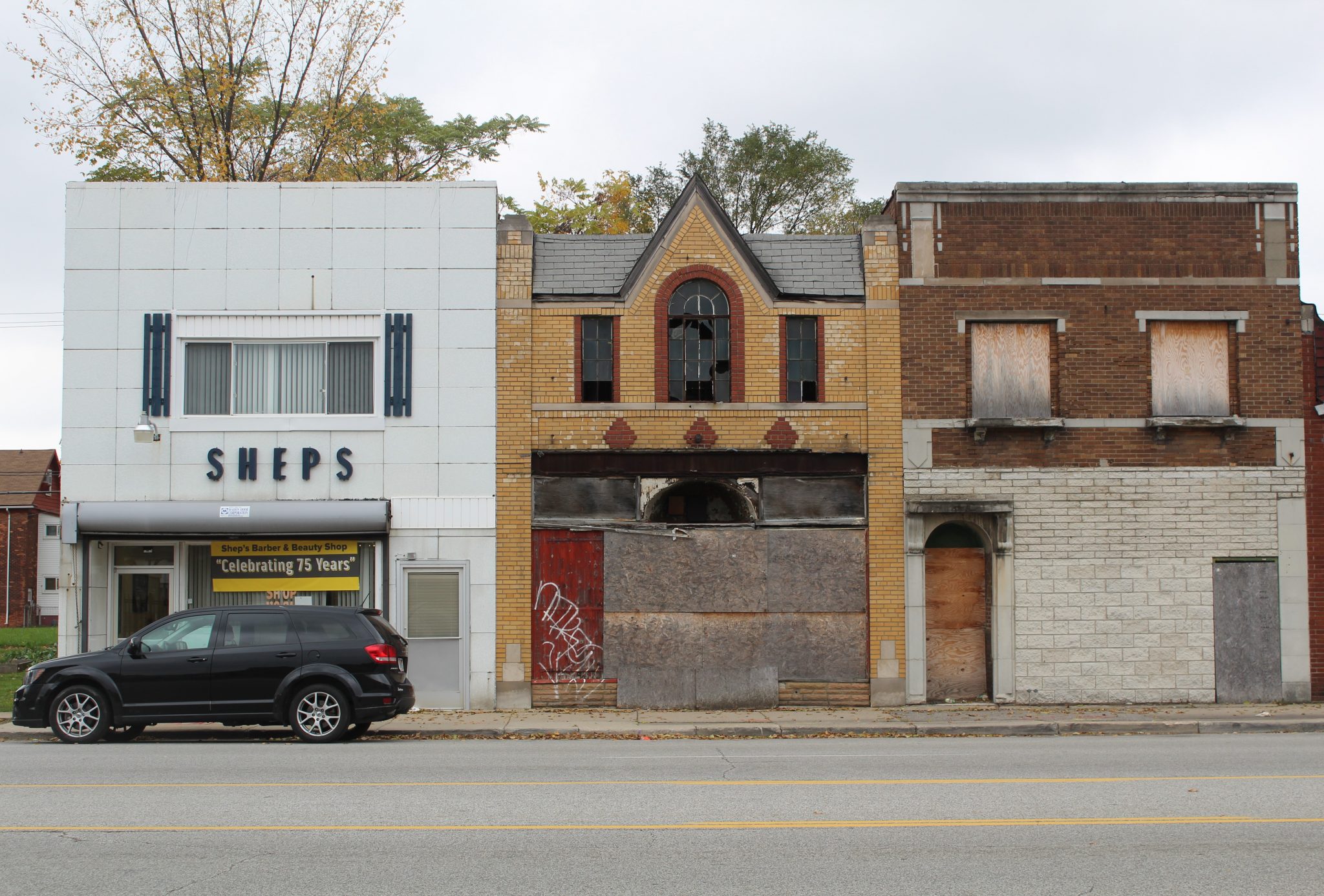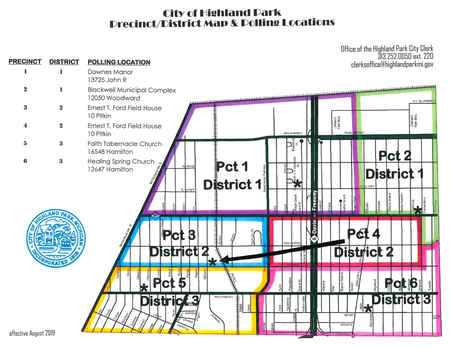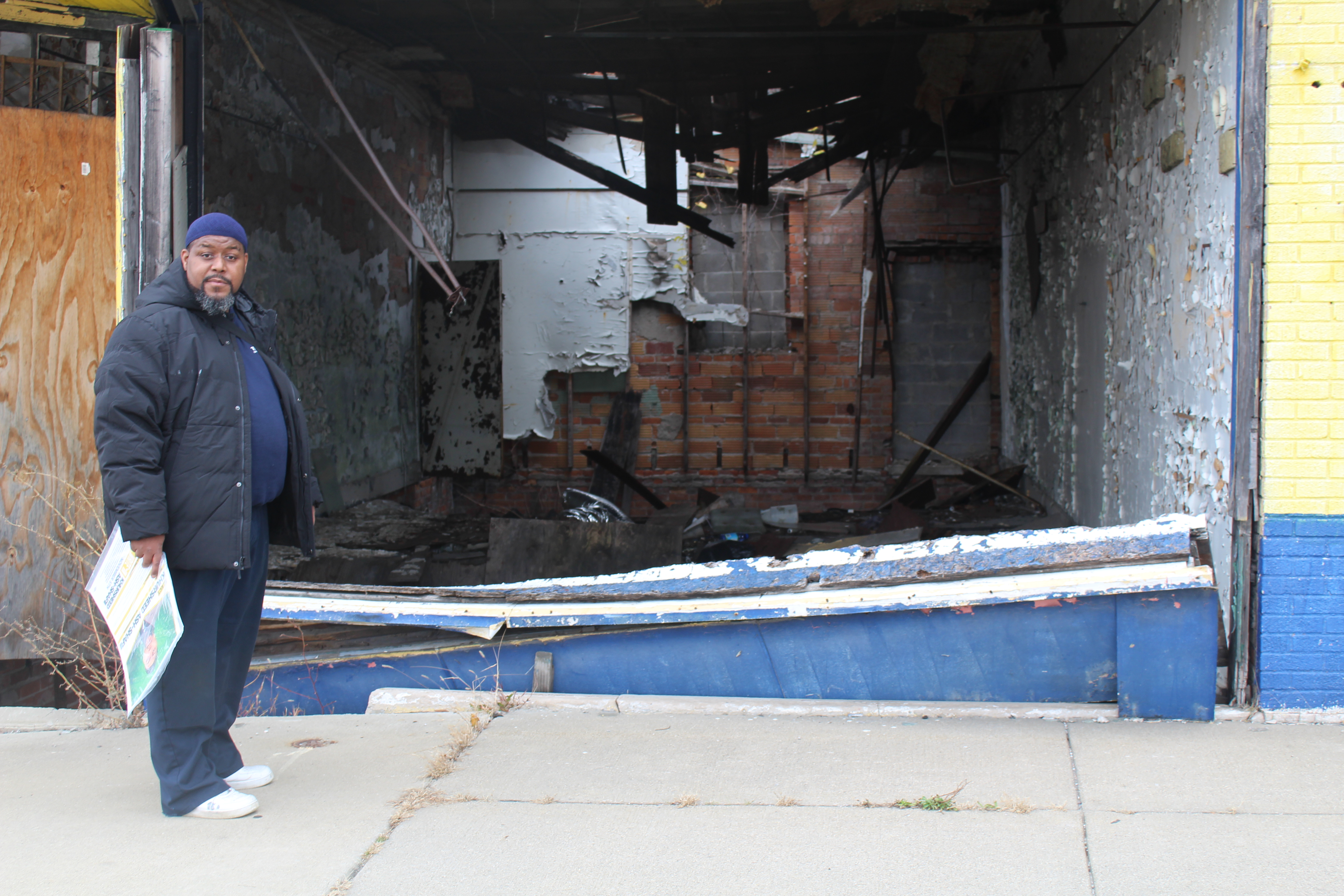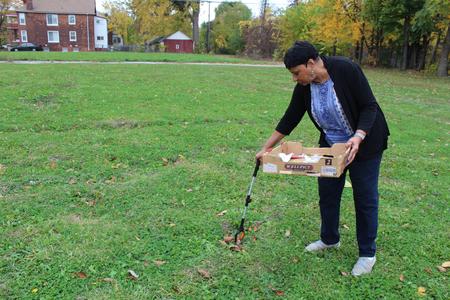In City Council Election, Highland Park Bets on Better Representation to Heal Divisions
For decades, the city has had a city council where all members were elected at-large. But tomorrow, as the city votes for districted representatives, residents and business owners in more neglected parts of the city are eager for representation.


This article was updated 11:16 a.m. 11/5/2019
Highland Park, Mich., like most municipalities in Wayne County, has had all at-large city council members for decades, where all the members are voted on by everyone in the city, and the ones elected serve the whole city.
But in tomorrow’s elections, the city will switch to have three city council elected by districts, while two remain at large.
The change represents a small shift in how democracy works in Highland Park, a 2.9 square-mile city entirely surrounded by Detroit. But it could represent huge gains for some regions of the city that some claim have been historically neglected.
WDET’s Laura Herberg, a Highland Park resident, reports on how community members feel about the switch.
Click on the player above to hear why some Highland Park residents, business owners say they’re eager for representation.
Khursheed Ash-Shafii is running for city council in what’s been deemed Highland Park’s third district, located on the far west side of the city.
He’s pounding the pavement on Hamilton Avenue – the districts’ main thoroughfare – with the goal of posting campaign fliers in businesses. The street is made up mostly of party stores, gas stations, churches and vacant lots. We pass by a parcel with trash scattered between overgrown bushes and trees.
“We get no code enforcement over here. You see buildings that are abandoned, houses that are abandoned, the grass is unkempt, as you can see.”
Ash-Shafii wasn’t a supporter of the switch to districted city council members, but then he warmed up.
“I realized that this would be an opportunity to get some true representation on this side of town,” he says.
“We have a division, right now, in this city. We’ve never been this divided ever as a community.” – Alexis Ramsey, Charter Commission

Ash-Shafii stops in front of a vacant lot with trash and overgrown brush.
“See all of this stuff right here? On the city ordinance this is all a fine,” he says.
“In all fairness, you do see some of this stuff throughout the city” I reply.
“Yeah. But not on the eastside of Woodward. It looks like a rosy little garden. But then you walk over here and it’s a whole ‘nother subject. It’s a whole ‘nother scene all of a sudden, right? Welcome to my world.”
Rise of the Suburbs, and At-Large Elections
The shift to at-large systems is relatively recent, but as had consequences for cities across the nation.
“It used to be, a long time ago, that all cities were districted,” says Jessica Trounstine, Professor of Political Science at the University of California Merced. When new cities were incorporated in the 1700 to 1800s, they all had districts or wards, says Trounstine. But that began to shift as the suburbs started to grow in the mid-20th century.
“I surely hope we are the most neglected because if anyone else is in this shape I feel for them.” – Dorothy Grigsby, Highland Park resident
Such systems can limit representation for racial minorities, research shows. They can also limit representation for residents living in certain areas of a city. “As suburbs became incorporated communities, many of them ended up with at-large systems,” says Trounstine.
Trounstine says it’s complicated but, basically there was a movement that swept the country and one of the things participants wanted was for city councils to run more like corporations, with a board of members that each represented the whole city.
With the switch to districted city council elections, Highland Park will join Detroit, Inkster, and Wayne as the only cities in Wayne County to have council districts.

Some Highland Park residents say they can see neglect and divestment around them.
Down the street from Ash-Shafii, in the same district, Dorothy Grigsby is using a claw on a stick to pick up trash. She stabs at something white.
“This a rubber glove. We don’t know what they may have used this rubber glove for,” Grigsby says.
Grigsby owns Shep’s Barber & Beauty Shop, an institution that’s been on Hamilton since 1965. Grigsby says when she first gets in, she heads outside to pick up litter on the vacant lots next door.
“If I do it every day it only takes me about 15 minutes,” she explains.
“If you’re not getting development, if you’re not getting the city services, if blight is not coming down in your area, you now have a person who now represents” you. – Alexis Ramsey, Charter Commission
“Do you feel like this part of Highland Park is neglected more than the rest of the city?” I ask.
“I surely hope we are the most neglected because if anyone else is in this shape I feel for them,” says Grigsby.
Her business sits in a row next to two abandoned storefronts. Grigsby says she used to ask for the buildings to be torn down but she’s given up.
The idea behind Highland Park’s new districts is that, now, residents and business owners will have one person they can hold accountable when things aren’t getting done in their area.
Divided City, Write-In Candidates
Alexis Ramsey sat on the commission that wrote the districts into the city’s charter. She says she voted against them at first but came around after she heard from residents who said they felt overlooked.
“So, if something’s not happening in your area, if you’re not getting development, if you’re not getting the city services that you feel like you should receive, if blight is not coming down in your area, you now have a person who now represents your area,” says Ramsey.
The charter that made way for districts was approved by Highland Park voters in May. The next step was to create a map. The city council drew one that Ramsey says was made up of oddly-shaped, “gerrymandered” districts.
WDET asked the City of Highland Park for the map that the city council drew. This is what they sent sent us.
The city took the council to court over the map and the council lost. These kinds of legal battles are common in Highland Park.
“We have a division, right now, in this city and it’s sad where we are. We’ve never been this divided ever as a community,” she says.
According to Ramsey, the current map was court-ordered and drawn by an outside company. It divides the city into three vertical sections, each two to four blocks wide. The hope is that by splitting up the city this way Highland Park may actually start to look more like one cohesive unit.
Polls in Highland Park will open Tuesday, Nov. 5, at 7 am, close at 8 pm
For city council, Highland Park residents can vote tomorrow for two at-large and one in their district. Because of the legal challenges to the map, district candidates are being forced to run as write-ins. Here’s who is running:
At-Large
Kendrich Bates
Carlton D. Clyburn Jr.
Temeko Manica
Rodney Patrick
City Council – District 1
Deblon Jackson (write-in)
Norma Lewis (write-in)
Temeko Manica (write-in)
Eban Morales (write-in)
City Council – District 2
Kendrich Bates (write-in)
Antonio Ervin (write-in)
Nancy Gambrill (write-in)
City Council – District 3
Derrick Armstrong (write-in)
Khursheed Ash-Shafii (write-in)
Doris Harris (write-in)
The Michigan State Bureau of Elections says its been a “longstanding practice to avoid publishing or mailing any lists of write-in candidates to voters regardless of the number of candidates running or the race.” In Highland Park that means City Clerk Brenda Green has not mailed out a list of write-in candidates and will not be supplying names at the polls.
“The write-in candidate would have to have campaigned in that particular district for the voter to know to write their name in and fill in the oval,” says Green.
Two candidates, Kendrich Bates and Tameko Manica, filed to run for as at-large city council candidates as well as in their districts.
“The law allows a candidate to run at-large here in Highland Park for council as well as be a write-in candidate for district, because the positions are totally different,” says Green. “At-large, you represent the entire city and districts you represent the particular citizens that are encompassed in your particular district where you live.”
However, Highland Park City Attorney William Ford says city council candidates can not actually run at-large and in a district. He says the reason is that there would be an issue if they won both seats. As a result he says the city’s attorney’s office has advised those two candidates to select one position to run for.
But candidate Kendrich Bates says he received an email from the Michigan Bureau of Elections that says candidates can run for both positions. The email says: “If one candidate is elected to both an at-large position and a district-based position, the candidate must select the one office in which he or she desires to serve; as to the office he or she declines, a vacancy will result which will be filled in accordance with the city charter.”
The email later says “BOE [Bureau of Elections] was contacted sometime during the summer by the Highland Park City Clerk and provided the guidance above; it is our understanding that the clerk, in turn, correctly advised candidates that they could run as both at-large and write-in candidates at the same time.”
Further down the email says “The City Attorney also claims that any votes that are validly cast for the same candidate in the at-large and district-based council positions are “void”, contrary to the plain language of MCL 168.558(5). His legal position jeopardizes the right to vote for Highland Park voters who, due to no fault of their own, may choose to mark their ballots for the same candidate in both positions.”
WDET is working to independently confirm this information from the Michigan Bureau of Elections.
Highland Park mayor, city clerk and treasurer are also up for election. For mayor, Highland Park City Council President Pro Tem Glenda McDonald is running against incumbent Mayor Hubert Yopp. For clerk, incumbent Brenda Green is facing write-in candidate Fawn Kern. For treasurer, incumbent Janice Taylor-Bibbs is running unopposed.
Polls in Highland Park will open tomorrow at 7 a.m. and close at 8 p.m.
